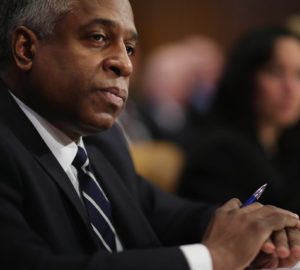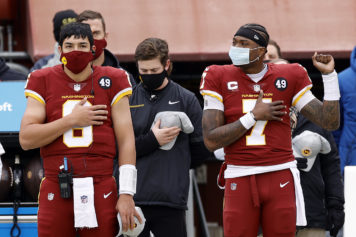
Goodell, certainly begrudgingly, selected B. Todd Jones, the departing director of the Bureau of Alcohol, Tobacco, Firearms and Explosives. Jones, 57, is the first Black person to oversee the disciplining of NFL players, a job that has become more important with Goodell’s heavy-handed rulings that has ruffled many players and gone awry of his powers.
Jones, a former United States attorney in Minnesota, became top dog at the bureau in 2011. He’s leaving there next week. His leadership is desperately needed in the NFL, which has endured more serious issues in recent years with player misconduct—including a player, Aaron Hernandez, on trial now for murder.
It wasn’t just the significant cloud of controversy around the Rice case, which reached a tipping point when it was revealed that the video inside the Atlantic City hotel elevator had been sent to the league office before Goodell initially ruled Rice would be suspended for three games for striking his wife.
When the video surfaced months later, and the country was shocked and outraged by the violent nature of it, Goodell changed his punishment to indefinite suspension. In the end, Rice won an appeal—a significant blow to Goodell.
If that was not bad enough, Adrian Peterson and his case of physically disciplining his son arose, another mess of a situation with all sorts of legal ramifications based on Goodell’s handling of the matter.
There also was Greg Hardy of Carolina’s case of domestic violence that gave the league its third major disciplinary case in a matter of months.
It was too much for Goodell to handle. He mismanaged each case, leading to mounting pressure for change. He acquiesced and will no longer have to discipline players accused of drug offenses, domestic violence and other off-field issues.
Under the new strategy, Jones will be in charge of disciplining players, while Lisa Friel, who works for the NFL as an adviser on domestic violence issues, will be in charge of investigating allegations of off-field misconduct. Jones and Friel will report to Goodell.
The NFL also created an owners committee, led by Michael Bidwill, a former federal prosecutor who owns the Arizona Cardinals, to oversee the league’s personal conduct policy, which needs revamping and more clarity.
The former judge, Barbara Jones, who overturned the Rice suspension, chided the NFL for the way it handled its disciplinary procedures.
But that was not it. In February, a federal judge in Minnesota also overturned Goodell’s suspension of Peterson, who pleaded no contest to charges that he beat his young son. The NFL has appealed that decision.
Once they are formally appointed, Jones and Friel are likely to have to decide what to do with Hardy, who remains suspended with pay after he was convicted of domestic violence.
His case, though, was overturned on appeal. The Cowboys this month signed Hardy, a defensive lineman, to a one-year contract even though it was unclear whether he would be suspended.
In other words, there is a lot of work for Jones to do. And his credentials indicate he’s up for the challenge that was too much for Goodell.


